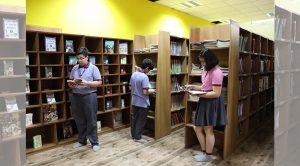The Knowledge Basket Series Part-4 Textbook Reading Strategies for Efficient Learning Outcomes A book is man’s best friend! However, in today’s world, with so much distraction from WhatsApp & Instagram, etc., it is becoming increasingly difficult for children to focus on reading. With an ever-changing world and an equally dynamic and progressive teaching-learning environment, it has become essential for learners to understand the importance of ‘textbook reading strategies for better and more efficient learning outcomes. The textbooks are taken as the most structured and apt coverage of the syllabus. Thus, they are the easiest sources of defining the subject content. The Top Schools in Gurugram showcase a variety of techniques in classroom teaching for inculcating the habit of regular textbook reading and practicing from the same. With the implementation of the New Education Policy, education, as well as assessment cycles are moving away from rote learning to comprehending concepts. To bring this into practice, the Top Schools in India, are emphasizing regular textbook reading, followed by the preparation of detailed notes and flowcharts by the learners and using numerous learning techniques discussed in the following reading. This helps them in getting a thorough understanding of the textbook material and at the same time getting an in-depth knowledge about the same. It is advised to the learner to get a preface of the book before they start to read it and at the initial level, they can go for systematic skimming and reading the headings and the pictures of the book to get a broader idea about the book. Read and Write At the next stage, the learner should try to reflect upon his/her learning. He/ she should go back to reading the text again, underlining only the important pointers, and converting them into short and crisp notes along with some supporting material in their own words. At the same time, the learner should also try to form associations with the book, by relating the content with some events with his life incidents and learning the dates in the book by matching these with one’s family’s important dates. For example, relating a government policy year with some birthday date of a family member. This helps in easy learning and longer retention of points. Read out Loud It is also necessary to read ideas and not just words from textbooks. A learner needs to make friends with the textbooks and read them with utmost interest, to get the complete information and extensive meaning about the chapters. The learners need to understand the ideology and the philosophy of the content and not just concise themselves to rote learning of the same. The top CBSE Schools believe that encouraging textbook reading helps in improving the concentration level and focus of the learner, which is essential for longer retention of the subject as well as help in improving this as a personality trait, for better performance in various tasks in the future. Teach to Learn The Best Way to Learn is to Teach !!! An additional tool for possessing mastery of the textbook content is to read it and then explain it to friends or others. Repeating this technique might help the learner in having a good command of the textbook content. When you teach a concept to others, you must be thorough with it. Also, when others ask some relevant questions on the same, it forces you to think deeper and while answering those questions, your understanding of the concept becomes ingrained, such that you will never forget that for life. An image is worth a thousand words!!! The learners are also trained to construct mind maps and graphic designs of the textbook content, for easy recapitulation of the text. These help in understanding the overall structure of the topic and help in establishing connections between various subtopics of the content. These also help us in quick revision of the text on the last days of the examination. Connect to Ideas The Best CBSE Schools in Gurugram engage the learners by helping them connect the textbook content with real-life situations, for developing their critical thinking and analytical skills. The learners are often asked to look around their world and bring up and discuss things that are related to their textbook content. All of the above textbook reading strategies help them grasp the concepts strongly and attain the required skills to attempt high-order thinking questions and competency-based questions correctly and efficiently. In all, it is believed that the more body senses are used in the reading and learning process, the more concrete outcomes it gives. As mentioned in the above discussion, one should try out reading, writing, speaking aloud, making songs on the text, games, puzzles, role plays, blog writing, computer graphics, pictures, comic strips, etc. to maximize learning using all body senses. The Best CBSE Schools in India also highlight the importance of textbook reading and providing numerous aids to the learner, to emphasize ‘the importance of networking for career success. It is seen and observed that learners who do exhaustive textbook studies can pull up well in competitive exams. Only with the rigorous practice of textbook content and an in-depth study of the same, schools can bring a learner to attain expertise in his/her field of study and thus help them choose the correct career paths as per their aptitude. Golden Rules for reading the textbook: To conclude, We would like to re-emphasize to the learner the ‘need and importance of textbook reading’ so that one could attain success not only in materialistic terms but also in terms of realizing outcomes as per one’s attitude, aptitude, diligence, interest, and one’s self-driven and chosen path in life. Textbook reading not only makes one impeccable in the content but also gives a correct direction to one’s ability by putting them into the apt career path that is most suitable for them. Skilled Specialist: Ms. Abha Bansal, HOD Commerce and Economics, MRIS-46, GurugramDecoding the Art of Textbook Learning
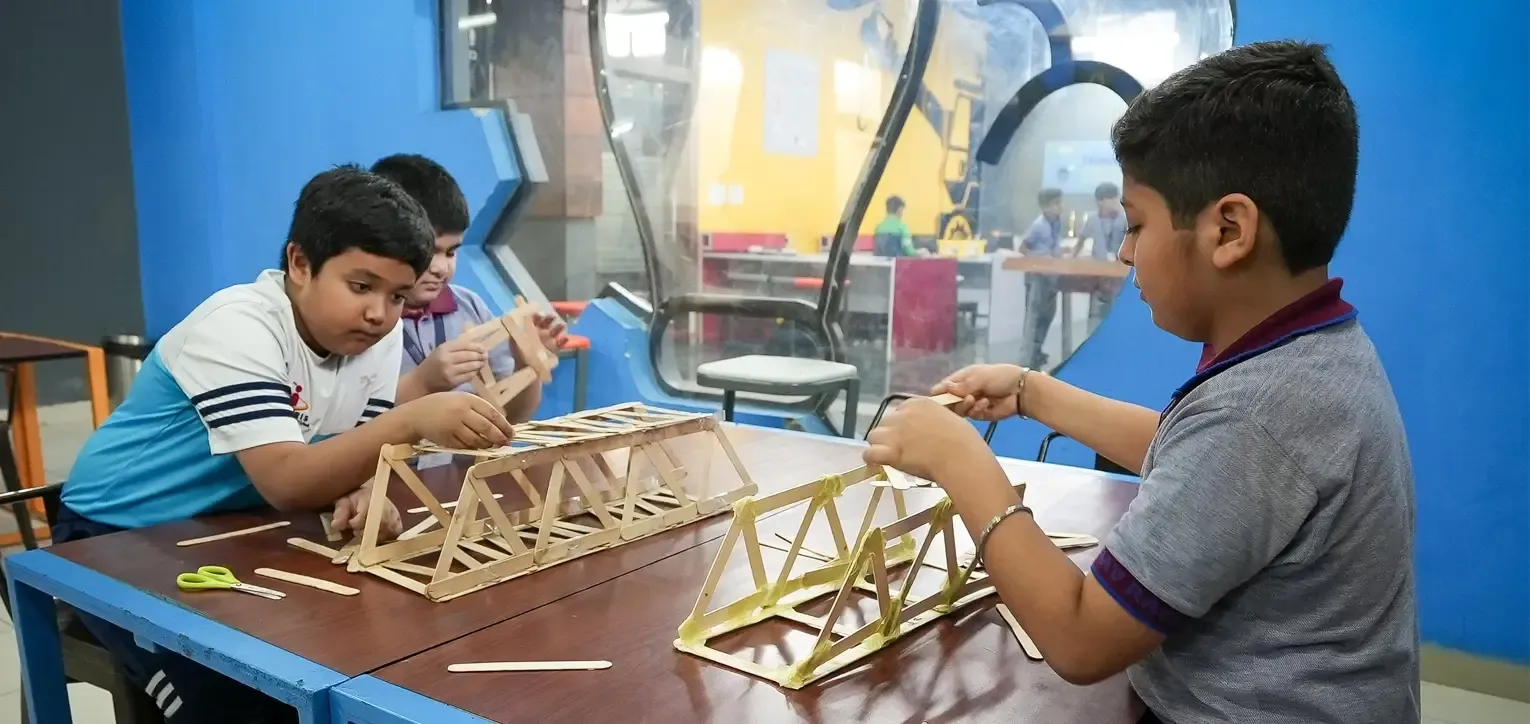
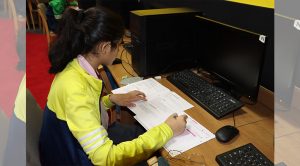 In International Schools in Gurugram, the faculty also emphasizes making regular pointers of the textbook material, including giving headings, and subheadings and summarizing the topics after reading the content, which helps in deeper understanding and retaining of the same. If the learner only reads the textbook chapter, he/she would probably remember 20% of what they read. But if they put their learning into written words, it helps in long-term memorization of the content.
In International Schools in Gurugram, the faculty also emphasizes making regular pointers of the textbook material, including giving headings, and subheadings and summarizing the topics after reading the content, which helps in deeper understanding and retaining of the same. If the learner only reads the textbook chapter, he/she would probably remember 20% of what they read. But if they put their learning into written words, it helps in long-term memorization of the content.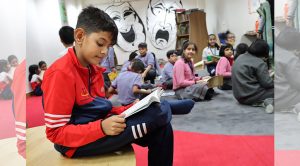 Sometimes, even reading the book loudly helps the learner in remembering the topics easily and increasing concentration at that moment. Reading textbooks helps learners gain more in-depth knowledge as compared to what they grasp from a video or an audio teaching, hence helping them in using it more productively.
Sometimes, even reading the book loudly helps the learner in remembering the topics easily and increasing concentration at that moment. Reading textbooks helps learners gain more in-depth knowledge as compared to what they grasp from a video or an audio teaching, hence helping them in using it more productively.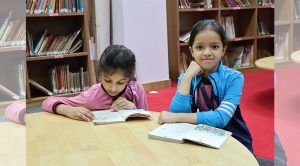 The CBSE Affiliated schools also encourage learners to draft brief manuscripts, puzzles, role plays, comic strips, and other playway instruments from the textbook content related to Bloom’s Taxonomy attributes, to ensure differential learning experiences. This encourages the learner to communicate and share their ideas with others and improvise on their learning with regular feedback from others. This also helps in trying out their learning from the textbooks and then correcting any mistakes while practicing the same.
The CBSE Affiliated schools also encourage learners to draft brief manuscripts, puzzles, role plays, comic strips, and other playway instruments from the textbook content related to Bloom’s Taxonomy attributes, to ensure differential learning experiences. This encourages the learner to communicate and share their ideas with others and improvise on their learning with regular feedback from others. This also helps in trying out their learning from the textbooks and then correcting any mistakes while practicing the same.